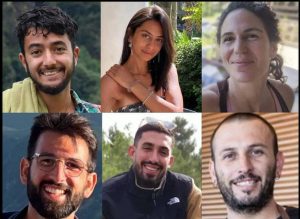There’s a prayer said at Jewish funerals called the Kaddish prayer, with words glorifying God and asking for world peace. After six of the hostages were brutally executed and their bodies recovered, the funerals in Israel were a time of mourning for the whole nation. It’s fitting then that the Kaddish prayer traditionally connects the personal grief of the families mourning their dead with the grief of the whole house of Israel.
According to My Jewish Learning, “The practice of reciting the mourner’s Kaddish seems to have begun in the years just after the Crusades, when a superabundance of mourners led to the tradition of linking personal grief with the collective grief of the Jewish people.” In Israel, mourning is a communal activity and the practice of “sitting shiva” is an open invitation to sit with the bereaved families, offering condolences, paying respects, and grieving together.
The six slain hostages
 Hersh Goldberg-Polin (23), Eden Yerushalmi (24), Carmel Gat (40), Almog Sarusi (27), Master Sergeant Ori Danino (25), and Alexander Lobanov (33), were some of the 240 people kidnapped by Hamas terrorists on October 7th, and murdered with a bullet to the head at point blank range while in captivity. On the 331st day since the massacre, the bodies of the six hostages were found in an underground tunnel in the Rafah area in the Gaza Strip and finally brought back home to Israel by the IDF and Security Services. Almost immediately they were laid to rest, with thousands lining the streets for the funerals in solidarity with the families.
Hersh Goldberg-Polin (23), Eden Yerushalmi (24), Carmel Gat (40), Almog Sarusi (27), Master Sergeant Ori Danino (25), and Alexander Lobanov (33), were some of the 240 people kidnapped by Hamas terrorists on October 7th, and murdered with a bullet to the head at point blank range while in captivity. On the 331st day since the massacre, the bodies of the six hostages were found in an underground tunnel in the Rafah area in the Gaza Strip and finally brought back home to Israel by the IDF and Security Services. Almost immediately they were laid to rest, with thousands lining the streets for the funerals in solidarity with the families.
Jon and Rachel Goldberg-Polin, parents of Hersh, had been tirelessly and publicly fighting for the freedom of their son and all the hostages for almost 11 months. All of the families had, but the Goldberg-Polin family had somehow found a way to make their voices heard across the world, and it was natural that Israelis would feel they were being represented every time Hersh’s parents spoke. “I feel he was like a symbol of the hostages,” said a teacher named Amnon Sadovsky. Many people felt that way. Hoping for Hersh’s return was driving so many both in Israel and the nations. The savage slaying of those six hostages has been a terrible blow to Israel as many are now grappling to find hope that anyone else could escape, or that Israel will ever be able to live in peace.
The Kaddish prayer causes us to look up
The people of Israel have been through hell, many times throughout the ages. But this season of horror since October 7 has been a severe national trauma for Israel. The words of the Kaddish prayer and the connection with the suffering of the Jewish people is more appropriate than ever. The word Kaddish is from the word for holy, kadosh, because the focus is on sanctifying the name of God. It’s at times like this when there is so little hope on the ground that we need the reminder—we have to look up.
Here are the words of the mourner’s kaddish, the prayers that were said in Israel at the funerals of the murdered hostages:
Glorified and sanctified be God’s great name throughout the world which He has created according to His will.
May He establish His kingdom in your lifetime and during your days, and within the life of the entire House of Israel, speedily and soon; and say, Amen.
May His great name be blessed forever and to all eternity. Blessed and praised, glorified and exalted, extolled and honored, adored and lauded be the name of the Holy One, blessed be He, beyond all the blessings and hymns, praises and consolations that are ever spoken in the world; and say, Amen.
May there be abundant peace from heaven, and life, for us and for all Israel; and say, Amen.
He who creates peace in His celestial heights, may He create peace for us and for all Israel; and say, Amen.
All Israel mourns together. May God comfort all the families and friends in their loss and pain, and we pray for the peace of Jerusalem.
Picture by Dan Meyers on Unsplash















